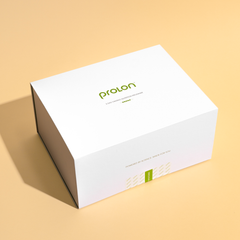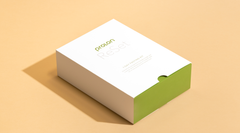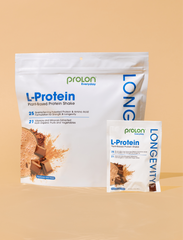
Intermittent Fasting vs Prolonged Fasting: What’s the Difference?
It’s no secret that fasting can bring you closer to better health. However, understanding the various methods of fasting and their unique benefits can be intimidating. The good news is that we're here to explain everything, so you can choose the best method for you. Let’s get into the differences between Intermittent Fasting (IF) and Prolonged Fasting (PF), as well as the benefits and drawbacks of each method. As always, we will reveal the scientific research behind these fasting methods, so you leave feeling like an expert in the topic.
The main differences between IF and PF:
The biggest difference between IF and PF is how long you consecutively fast. IF consists of fasting for less than two days, typically between 12-48 hours. PF consists of fasting for more than two days. The length of time determines the specific health benefits you reap.
Let’s talk about one kind of IF: Time Restricted Feeding
There are many different types of IF. Some variations consist of 24-to 48-hours of water fasting, while others don’t always require avoiding food all day. For example, time restricted eating (TRE) focuses on when you eat. Usually, you’ll eat during a specific window each day avoiding food outside that window of time. For instance, you might eat between 8a - 8p and then fast for the following 12 hours. If you take this route, you will follow a 12:12 IF pattern. Others enjoy 14:10 IF schedule, fasting for 14 hours and eating for 10 hours. For those looking for something on the stricter side, you could follow a 16:8 pattern, fasting for 16 hours and eating for 8 hours (16 hours of fasting, 8 hours of eating). Regardless of the schedule you pick, you're eating food every day within the TRE schedule.
A bonus to TRE is that you can enjoy our Fasting Bar or Fasting Shake even while you’re fasting. Both are safe to consume during your fasting window, meaning you won't break your fast, and your ketones – the use of fat for fuel - will remain elevated. Talk about the best of the best worlds! These additions are great as a breakfast alternative and can serve as a replacement for dinner or post-dinner snacks. The choice is yours.
The 5:2 IF Method:
The 5:2 method is another kind of IF that consists of eating five days a week and fasting for two, non-consecutive days. On fasting days, you can choose to drink only water; alternatively, you can use Prolon’s 1-Day Reset which gives you precise food formulas that stay below your nutrient sensing pathways (NSP). This means that your body will transition into ketosis as you consume some food.
For those following this method, your fasting days are typically scattered throughout the week, but not on consecutive days. For instance, you might fast on Mondays and Thursdays. The other five days, you eat without calorie restrictions.
What are the benefits of IF?
- Smaller window to consume calories. Because you're reducing the hours when you eat, you're naturally restricting the calories you can consume. Constant eating or snacking can lead us to consuming extra calories, which can result in excessive weight gain, poor sleep, and other health issues. By setting limitations, you're defining when your caloric intake stops. Creating one step towards managing your eating habits and weight.
- Tapping into our fat stores for fuel. Depending on how strict you're eating hours are, you're giving your body room to use your stored fat as fuel, which is something called ketosis. We often transition to ketosis around the 12-hour fasting mark. When we're constantly eating, your body will prioritize using glucose as fuel rather than your stored fat (which is what most of us are aiming to lose). This is why it can be challenging to lose weight. If you extend the “fasting” part of your day by a few hours, you give your body a moment to use excess fat stores as fuel instead. This will contribute to your health and waistline in many ways.
- Become more sensitive to insulin. When you eat, your body releases insulin to transport glucose (sugar) from the bloodstream into cells for energy or storage. With fasting, during extended periods of not eating, as is seen in TRE IF, insulin levels significantly drop. The reduction in insulin helps the body become more sensitive to it, improving blood sugar control, and reduces the risk of insulin resistance and Type 2 Diabetes.
- Improved insulin sensitivity. Research has shown that IF can regulate blood sugar levels and enhance insulin sensitivity, making it beneficial for those at risk of diabetes.
Considerations and drawbacks of IF:
The success of IF depends on you. Consistency with your fasting schedule is vital. Some people do find it challenging to avoid overeating during their open window. We advise eating balanced meals that align with your health goals. Please do not spend your eating window consuming processed junk food because it can cause long-term health issues down the line, and it defeats the purpose of fasting.
Let’s switch gears and discuss Prolonged Fasting (PF):
PF consists of extended fasting periods with zero - or very low - caloric intake, typically lasting 48 hours (about 2 days) or more. This kind of fast can be divvied up into water fasting, consuming only water, dry fasting which is no food or water, or Prolon’s 5-Day Fasting Program, which is the only patented Fasting Mimicking Diet (FMD) that mimics the benefits of a fast while allowing food consumption.
Research supports the impressive metabolic and cellular benefits of prolonged fasting. Benefits include a more expansive, deep, and cellular rejuvenation by increasing autophagy, a process awarded the Nobel Prize in Medicine in 2016. The power of autophagy typically activates on day three of your prolonged fast. Because you are avoiding food longer, PF is much more challenging but reaps the biggest health rewards.
This is another reason to invest in Prolon 5-Day versus following a prolonged water fast. In fact, the National Institute of Health (NIH) sponsored the development of the Prolon 5-Day FMD, which has been tested in 18+ clinical trials and awarded over 50 patents. This program provides essential nutrients and empowers you to follow a circadian eating pattern, all while activating those same autophagy pathways that are sought after during traditional PF. Not to mention, Prolon helps to protect your muscle mass, which is uncommon during a water-only fast.
What are the Benefits of PF?
- Deep fat burning & weight loss: You’ll say goodbye to those stubborn fat stores by using them as fuel for a longer time.
- Improved immune function: Research suggests that fasting can boost your immune system and function.
- Reduced cancer risk: Studies indicate that fasting can slow down cancer cell growth by reducing glucose levels. And could possibly complement cancer treatments by reducing their side effects.
- Reduced insulin resistance: Fasting can improve insulin sensitivity, blood glucose management, and can reduce HbA1c and assist with reducing the need for diabetic medications.
- Cardiovascular health: Lower your chances of heart failure and metabolic syndrome, improving blood pressure, blood sugar, cholesterol, triglycerides, and abdominal fat levels.
- Slow down aging and promote longevity: The power of autophagy and cellular repair contributes to healthy aging and reduces the risk factors for age related diseases.
Considerations and drawbacks of PF:
While PF offers substantial benefits, there are things to consider:
- Medical supervision: Extended water fasts require medical supervision due to potential side effects, like nutrient deficiencies and electrolyte imbalances. It is important to note, however, that Prolon’s 5-Day FMD does not require such medical oversight due to its nutritional content and documented safety for most patients.
- Not for everyone: PF may not be suitable for individuals with specific medical conditions. We advise consulting a healthcare professional before attempting prolonged fasting.
Choose the right approach for you.
When selecting a fasting approach, think about the following factors:
- Personal goals and preference: Ensure the fast aligns with your health and fitness goals. Take your daily routines and preferences into account to avoid disruption.
- Health status and medical advice: Safety always comes first. Consult healthcare professionals before starting any fasting regimen, especially if you have underlying medical conditions.
- Lifestyle and daily routine: Consider how your daily activities align with your chosen fasting method and how you can balance the fasting practices with your daily routine.
- Combining elements of both methods:
When it comes to fasting, there are many routes you can take. All roads lead to a healthier version of you, so you can never make the wrong choice. As your guide to longevity, please use our expertise as your power. Here’s to fasting and the goodness it has to offer.












